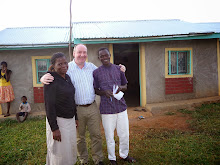There was a
beautiful sunset last night.
One of the best things about the clear hot days is the red sky as the sun slows sinks into the watery horizon. The African Fish Eagle, perched on the bare branches of the tree on the lake shore watches on. He has feasted this evening on nile perch, freshly plucked from the waters of the Lake. The familiar black kites circle overhead and the low grunting of hippo’s fills the air with their resonant bass.
It’s beautiful to sit and watch. The sun sets so quickly. Just a minute after it touches the horizon it is gone, leaving nothing but a red glow in the sky.
We have had a good day, taking the children to eat fish in the shacks by the side of the Lake. I always enjoy times like this. It is a chance to talk with the children and to spend a little bit of time with them. The shacks are full of families, enjoying their Saturday afternoon lunch and we feel like a family too. The boys are smartly dressed in brand new football tops, donated by kitbag.com, one of the companies in the group that I work for. The tops are from the wide variety of clubs that kitbag work with and carry the names of those clubs top players. The children were delighted with them and debated with each other earnestly who would be Juan Mata and who would be Mesut Ozil.
We ate at Hotel Furaha (it means laughter or happiness), dining on freshly caught tilapia, stewed in tomato and served with the ubiquitous ugali (maize porridge). Dining here does not stand on ceremony, there are no knives or forks. The etiquette is to tear off a small piece of ugali, roll it between your fingers and then make a small depression with the thumb. Using this ugali, scoop up the sauce, whilst prizing the white flesh of the fish from its long bones.
To be honest, the African Fish Eagle, with its purpose made implements, may well do a better job than I do. But the children are experts. I watch on as they dissect the fish with expert fingers and eat until they are full.
Many of the children are away at the moment. Now that the school year is done they visit relatives or go to their homes. This is a key part of the Trust’s home reintegration strategy. The children will stay with us for a period of time, becoming accustomed to life away from the streets, but the end goal is for them to return to their home and community. It is how they will ultimately become independent.
So today there were 20 of us, full of fish and happy to have been well fed. Those that weren’t are, perhaps, taking the first steps in learning to fish for themselves.
As the sun set, so the fishermen set out for the night. It is too hot for the fish during the day and they are around only during the night or in the cool of the early morning. I watched the sky move from red to black and a million stars emerged above Africa.
And the hippos rumbled on.








